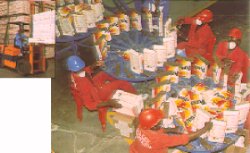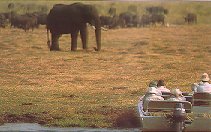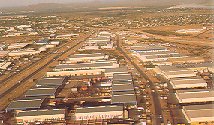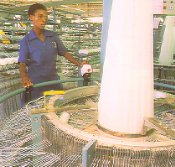


In order to penetrate regional and global markets, a country following
an outward-oriented policy needs to produce high quality goods
and services that are competitive in such markets. The main thrust
of economic development in Botswana is diversification in order
to reduce the dependence of the economy on the traditional mining
and agricultural sectors. To achieve this, a great many innovative
industrial and commercial policies need to be implemented.
Workers on a production line, folding and pasting soap boxes at a factory in Gaborone. Inset: Inside
a wharehouse containing sugar.
INDUSTRIAL DEVELOPMENT OBJECTIVES
Principal motivator in this region in the Ministry of Commerce and Industry through the provision of various programs including training in technical and business management skills, industrial technological research, financial grants, and promotion of locally produced goods. The government has identified the following objectives for industrial development:
A major study on the opportunities for industrial development, a joint project of government and World Bank officials, has been completed, with the results intended to assist in keeping such policies in line with emerging economic and political situations, both regionally and internationally.
AGENCY FOR DEVELOPMENT
The primary task of the country's main agency for commercial and
industrial development is to identify investment opportunities
in Botswana for both local and foreign investors. The Botswana
Development Corporation (BDC), with more than 100 companies spread
across the entire spectrum of the economy of Botswana, continues
to play a leading role in the promotion of private sector development.
The corporation has interests in a widely divergent group of
companies and enterprises, extending from agricultural activities
to industrial development, from textiles to brick manufacturing,
from hotel development and tourism to stockbroking. Although
economic conditions continued to have an adverse effect on some
sectors of the economy, an upturn is expected in the coming year.

A busy street in downtown Gaborone, one of the fastest growing cities in the world.
The need for a dynamic and diverse economy ranks supreme on the corporation's agenda for commercial and industrial development. Set up to generate additional business opportunities and provide the best possible investment advice, BDC assists with long-term loans, share capital, factory space and premises, and guarantees and feasibility studies.
During the year the corporation initiated a consultancy to facilitation a formalized but gradual divestment plan which would complement its long-term objectives to divest from successful group companies. A comprehensive marketing plan was also initiated to strengthen corporate activities and to create a better understanding of the Botswana economy in relation to the rest of the world. Bringing development plans to fruition is a vital and valuable function of the operation of the Botswana Development Corporation - and the primary link between itself and the investor.
PROSPECTS FOR GROWTH
From 1992, it became clear that Botswana was not immune from the
impact of the international recession - in the 10 or 20 year period
before that, Botswana's fast-growing economy had seemingly been
fairly impervious to the accepted economic difficulties faced
by both developed and developing countries. With the inflation
levels in regional trading partners continuing their downward
trend in 1994, Botswana can also expect to derive the benefits
of a continued decline in its inflation level, although growth
in the global economy has continued to be sluggish. Such modest
growth has been attributable to, among other factors, weak global
economic recovery, weaker-than-expected export markets, and fragility
of business and consumer confidence.

Tourism is an important source of revenue in Botswana.
Economic growth for Africa, as whole, decelerated to 1,6 percent in 1993 from the rate of 2,4 percent recorded in the previous two years. This unsatisfactory situation was caused by civil strife in some African countries, adverse climatic conditions, as well as continued weak export growth hampered by overvalued exchange rates, weak demand for primary products in industrial countries and waning support from the international donor community. Many member states are undertaking structural adjustment programs and are moving towards market-oriented systems in order to improve efficiency.
Prospects for world economic growth during 1994 are, however, encouraging, with Africa projected to grow at 2,6 percent. However, provision of concessionary financial resources, the opening up of markets to African exports and improved commodity prices are imperative to rekindling African economic growth.
In 1991/92 the SADC region experienced the worst drought in history,
resulting in overall food shortage of about 7 million tonnes;
in the following year some SADC countries, including Botswana,
again declared drought conditions, although total food shortage
in 1992/93 was only 2,63 million tonnes compared with that of
the previous period. With the improvement in rainfall, it is
hoped that supply of food will improve and the SADC region will
be able to meet its requirements.

Gborone West Industrial Site ->
With Botswana's major exports adversely affected between 1991 and 1993, preliminary mid-term review forecast of the National Development Plan 7 (NDP 7) indicate that national output grew only marginally. The real Gross Domestic Product is estimated to have grown by 1,8 percent in 1991/92 and is further forecast to grow by 2 percent by 1993/94. With the projected recovery in the international economic situation which is expected to increase the demand for Botswana's exports of diamonds, textile and beef, as well as that of the service sectors of tourism, water, electricity, construction and others, real GDP is expected to grow more rapidly in the later years of the NDP 7. With expected recovery from the international recession and a resumption of modest domestic economic growth, per capita GDP and national welfare should improve.
Developments in the diamond market coupled with slower growth in imports during 1993 contributed positively to Botswana's balance of payments position.
Exports of manufactured goods, particularly textiles and garments, have been of increasing importance in recent years, although the growth has been a fragile one.
Tending to production at a bag weaving machine in the Bolux
Milling Factory, situated in Francistown.

EMPLOYMENT OPPORTUNITIES
As a result of the slow recovery in world economy in general and the downturn experienced in Botswana's economy, formal employment has decreased on a yearly basis of 1993. The private sector share in total formal employment declined as a reflection of retrenchments, while that of central and local government, as well as parastatals, increased.
With Botswana's population continuing to grow rapidly, pressure is being put on the ability of the country to provide adequate employment opportunities as well as other social services. In order to enhance Botswana participation in business the government, through the Integrated Field Services, continues to promote training for small and medium scale locally owned enterprises throughout the country, particularly in management and production-related skills. A total of more than 880 persons were trained under the program in the first half of the 1993/94 financial year compared to nearly 1600 during the whole of 1992/93. Individuals are trained in various skills such as baking, blacksmithery, carpentry, tanning, patchwork, leatherwork, bine carving and foundry work.
Moreover, training grants, under the Financial Assistance Policy, have been helpful in enabling workers (including skilled and semi-skilled, supervisors and managers) to acquire skills through on-the-job training and learning-by-doing on factory floors, in export salesrooms and in managers' offices. During 1993 a total of more than 440 projects, with the potential to create an additional 56355 jobs, were approved.

 go back
go back